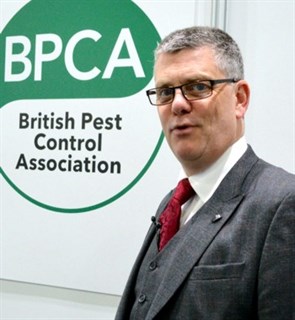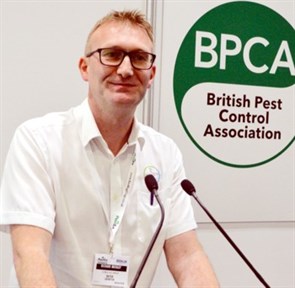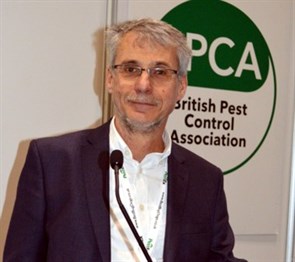PestEx 2017 staged a wide-ranging programme of seminars split between two separate areas, one dedicated to technical topics, the other to business matters. Over the two days there was something for everyone.
|
Holding seminars in an exhibition environment is never easy. Encouraging visitors to leave the exhibition for a distant seminar room puts delegates off. On the other hand, a seminar area within the exhibition space itself entails speakers competing with the hubbub of the exhibition. But technology has now solved this perennial problem and, for the second time at PestEx, audio headsets were provided to audience and speakers alike. Even these did not fully filter out the announcement tannoy, ironically usually promoting forthcoming seminars and listeners to the technical seminars sometimes found themselves disoriented as their headsets were tuned into the business seminars and vice versa! Nevertheless this is a satisfactory solution to a long standing PestEx problem. We couldn’t attend every session and in this report we focus on the technical sessions – watch out for more from the business ones in future issues of Pest magazine. So, here’s a review of what we found of interest in the technical area. Pest control on farm There is an expectation that everything in an exhibition seminar has to be new and ground-breaking. The art of a ‘refresher course’ is to remind people of the basics whilst making it sound fresh. Dr Sievert did just that. By concentrating on a farming situation and, backed up by some statistics that we had not seen before, he reminded us what pest controllers should be setting out to achieve in the first place. In a world of risk and environmental assessments it is easy to forget the purpose of the job we are doing. Food allergy can kill He then quantified the issue – 2-3% of adults and 5-8% of children suffer from a food allergy, with some triggered by exposure to as little as 1ppm (part per million) of allergen. The problem is well understood by businesses preparing and serving food but how well is it appreciated by those providing services to those food businesses? Contamination can be direct, what’s in the bait? What happens when the bait is moved? What about bait on traps (peanut butter, fruit and nut chocolate)? Even low level contamination can cause problems. Contamination can also be indirect – with pest controllers dealing with multiple calls in a day, are allergens being brought in on footwear, coveralls or even on baits and bait boxes being relocated from one site to another? An interesting topic worth further investigation. Stewardship for insecticides? Whilst it is tempting to think that the issues facing rodenticides were a ‘one off’ there are parallels in amenity, turf, forestry and other sectors. Here certificates of competence and membership of CPD systems have been the norm for much longer than in pest control. Even though much less insecticide is being applied and, usually at lower concentrations in our sector compared with those above, we are using those products in sensitive situations – homes, schools, hospitals – so we probably should expect extra scrutiny. Registration authorities are calling for more and more sophisticated data, potentially making labels even more complex. These same authorities recognise the risks posed by such complex labels and may compensate by restricting where, and by whom, the products can be applied. Can we afford to do nothing and wait? Probably a bad idea. We should learn the lesson of rodenticides and plan for challenges ahead. |
|
|
| Invasive species cost some £1.2 billion Clive Boase from the Pest Management Consultancy highlighted the cost to the UK economy of invasive species which is estimated at some £1.2bn a year. So, do we accept that cost or do we ‘fight back’? To be classified as an invasive species the animal or plant has to be non-native to the UK, introduced via human activity, have negative impacts and be spreading. A classic example is the North American mink, with its detrimental effect on a range of water dwelling species, not least the water vole. Other species threatening biodiversity are the rabbit, grey squirrel and harlequin ladybird. Varroa mite and Asian hornets impact on animal health, the Tiger mosquito on human health and infrastructure is harmed by invasive plant species such as Japanese knotweed and buddleia. Yes, we are fighting back. Work in the Scilly Isles to eradicate the brown rat has led to Manx Shearwaters and Storm Petrels now raising chicks for the first time in decades. Tiger mosquitoes (responsible for cases of dengue and chikungunya in Italy and France) were discovered at a service station on the M20. Eradication work was carried out. |
||
| International feel Two speakers from outside the UK gave an international feel to the presentations. Birds… …and bedbugs He may well have not won too many friends at the start of his talk by telling the audience the UK was 10 years behind the USA. Those present rather took this to mean their expertise was 10 years behind, what he meant to say was the level of bed bug infestation in the UK was 10 years behind! Having got over this initial misunderstanding, Jeff went on the chart the rise of the problem this side of the Atlantic and compared it to the position and treatment regimes in the USA. This made for an interesting session and did cause some controversy amongst those present which will be reported on at greater length in a future edition of Pest. |
||



 Tony Harman and John Somner – wired for sound!
Tony Harman and John Somner – wired for sound!



